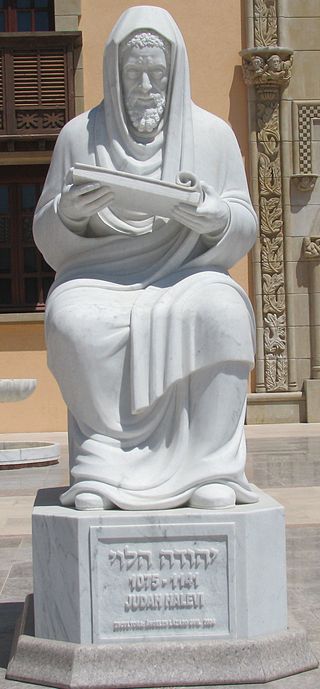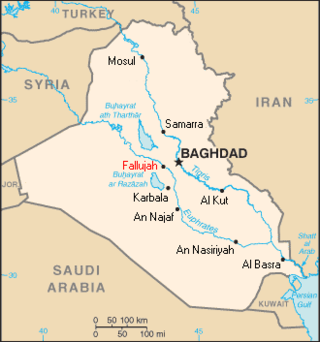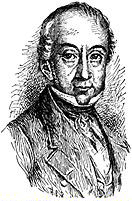Related Research Articles

Judah Halevi was a Spanish Jewish physician, poet and philosopher. He was born in Spain, either in Toledo or Tudela, in 1075 or 1086, and died shortly after arriving in the Holy Land in 1141, at that point the Crusader Kingdom of Jerusalem.

Hai ben Sherira better known as Hai Gaon, was a medieval Jewish theologian, rabbi and scholar who served as Gaon of the Talmudic academy of Pumbedita during the early 11th century. He was born in 939 and died on March 28, 1038. He received his Talmudic education from his father, Sherira ben Hanina, and in early life acted as his assistant in teaching. In his forty-fourth year he became associated with his father as "av bet din," and with him delivered many joint decisions. According to Sefer HaKabbalah of Rabbi Abraham ben David (Ravad), he was the last of the Geonim.
Solomon ibn Gabirol or Solomon ben Judah was an 11th-century Andalusian poet and Jewish philosopher in the Neo-Platonic tradition. He published over a hundred poems, as well as works of biblical exegesis, philosophy, ethics and satire. One source credits ibn Gabirol with creating a golem, possibly female, for household chores.

Moritz Steinschneider was a Moravian bibliographer and Orientalist. He received his early instruction in Hebrew from his father, Jacob Steinschneider, who was not only an expert Talmudist, but was also well versed in secular science. The house of the elder Steinschneider was the rendezvous of a few progressive Hebraists, among whom was his brother-in-law, the physician and writer Gideon Brecher.

Samuel David Luzzatto, also known by the Hebrew acronym Shadal (שד״ל), was an Italian Jewish scholar, poet, and a member of the Wissenschaft des Judentums movement.

Abraham Dov Ber Lebensohn, also known by the pen names Abraham Dov-Ber Michailishker and Adam ha-Kohen, was a Lithuanian Jewish Hebraist, poet and educator.
Azariah ben Moses dei Rossi was an Italian-Jewish physician and scholar. He was born at Mantua in c. 1511; and died in 1578. He was descended from an old Jewish family which, according to a tradition, was brought by Titus from Jerusalem. He was known among Jews as Azariah min-Ha'adumim, a play on his name as well as a possible allusion to the fact that he lived in Catholic Italy, Rome being regarded as a spiritual heir of Esau. Combining an insatiable desire for learning with remarkable mental power, Dei Rossi early in life became exceptionally proficient in Hebrew, Latin, and Italian literature. He studied simultaneously medicine, archeology, history, Greek and Roman antiquities, and Christian ecclesiastical history. When about the age of thirty he married and settled for a time at Ferrara. Later he was found at Ancona, Bologna, Sabbionetta, and again at Ferrara. In 1570 a terrible earthquake visited the last-named city and caused the death of about 200 persons. The house in which Dei Rossi lived was partly destroyed; but it happened that at the moment he and his wife were in their daughter's room, which remained uninjured. During the disturbances consequent upon the earthquake Dei Rossi lived in an outlying village, where he was thrown into association with a Christian scholar, who asked him if there existed a Hebrew translation of the Letter of Aristeas. Dei Rossi answered in the negative, but in twenty days he prepared the desired translation, which he entitled Hadrat Zekenim. His account of the earthquake, written shortly after, is entitled Kol Elohim; he regarded the earthquake as a visitation of God, and not merely as a natural phenomenon.
Moses ben Mordecai Zacuto, also known by the Hebrew acronym RaMa"Z, was a rabbi, Kabbalist, and poet. Zacuto, who was born into a Portuguese Marrano family in Amsterdam, studied Jewish subjects under Saul Levi Morteira. He also studied secular subjects, such as the Latin language. As a pupil of Morteira, he may also have been, as a youth still in Amsterdam, a fellow student of Baruch Spinoza.

Shabbethai Donnolo was a Graeco-Italian Jewish physician, and writer on medicine and astrology.

Wilhelm Bacher was a Jewish Hungarian scholar, rabbi, Orientalist and linguist, born in Liptó-Szent-Miklós, Hungary to the Hebrew writer Simon Bacher. Wilhelm was himself a prolific writer, authoring or co-authoring approximately 750 works. He was a contributor to many encyclopedias, and was a major contributor to the landmark Jewish Encyclopedia throughout all its 12 volumes. Although almost all of Bacher's works were written in German or Hungarian, at the urging of Hayyim Nahman Bialik many were subsequently translated into Hebrew by Alexander Siskind Rabinovitz.

Isaac Samuel Reggio (YaShaR) was an Austro-Italian scholar and rabbi. He was born and died in Gorizia.
Isaac Abraham Euchel was a Hebrew author and founder of the "Haskalah-movement".
Isaac Satanow was a Polish-Jewish maskil, scholar, and poet.
Jacob Raphael Fürstenthal was a German Jewish poet, translator, and Hebrew writer.

Salomon Mandelkern was a Russian-Jewish poet and author.

Meïr Halevi (Max) Letteris was an Austrian poet, editor, and translator of the Galician Haskala. He translated into Hebrew works by Virgil, Lucian, Jean Racine, Lord Byron, Johann Wolfgang von Goethe, Friedrich Schiller, Ludwig August von Frankl, and others.

Eleazar ben Kalir, also known as Eleazar HaKalir, Eleazar ben Killir or Eleazar Kalir was a Byzantine Jew and a Hebrew poet whose classical liturgical verses, known as piyut, have continued to be sung through the centuries during significant religious services, including those on Tisha B'Av and on the sabbath after a wedding. He was one of Judaism's earliest and most prolific of the paytanim. He wrote piyutim for all the main Jewish festivals, for special Sabbaths, for weekdays of festive character, and for the fasts. Many of his hymns have found their way into festive prayers of the Ashkenazi Jews' synagogal rite.
Kalonymos or Kalonymus is a prominent Jewish family who lived in Italy, mostly in Lucca and in Rome, which, after the settlement at Mainz and Speyer of several of its members, took during many generations a leading part in the development of Jewish learning in Germany. The family is according to many considered the foundation of Hachmei Provence and the Ashkenazi Hasidim.

Judah Leib Ben-Ze'ev was a Galician Jewish philologist, lexicographer, and Biblical scholar. He was a member of the Me'assefim group of Hebrew writers, and a "forceful proponent of revitalizing the Hebrew language".
Abraham ben Daniel of Modena was an Italian poet and rabbi.
References
- ↑ "Romanelli, Samuel Aaron". Jewish Virtual Library. American–Israeli Cooperative Enterprise . Retrieved 23 October 2017.
- ↑ Romanelli, Samuel (2004). Stillman, Yedida (ed.). Travail in an Arab land. Tuscaloosa: University of Alabama Press. ISBN 978-0-8173-5135-9.
- ↑ Bejjit, Karim. "A Jew in a Muslim Land: The Narrative of Samuel Romanelli". Writing the Maghreb (blog). Retrieved 23 October 2017.
 This article incorporates text from a publication now in the public domain : Singer, Isidore; et al., eds. (1901–1906). "ROMANELLI, SAMUEL AARON". The Jewish Encyclopedia . New York: Funk & Wagnalls.
This article incorporates text from a publication now in the public domain : Singer, Isidore; et al., eds. (1901–1906). "ROMANELLI, SAMUEL AARON". The Jewish Encyclopedia . New York: Funk & Wagnalls.